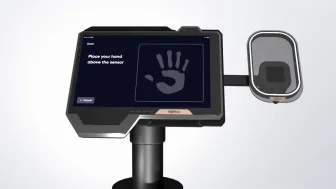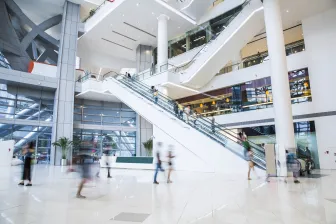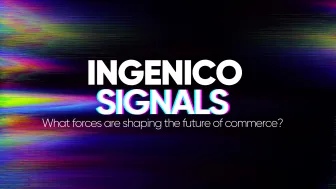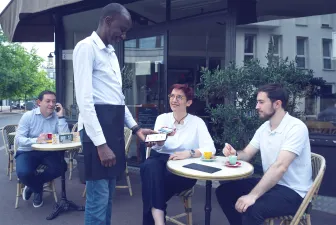In this interview, Vincent Liang, CEO and founder of Turn Cloud Technologies, discusses with our expert Boris Ferlet, VP Channel Development at Ingenico, how Android and the cloud can help merchants in the new world of commerce.
1. To your opinion what are the main challenges merchants face?
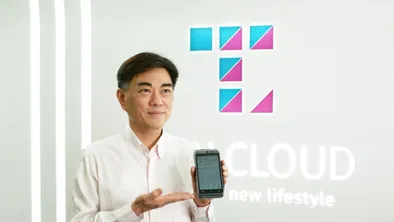
"Technology can be an extraordinary tool for merchants of all sizes to streamline their operations and deliver better experiences to their customers but finding the right solution can be overwhelming."

"Vincent mentioned the challenges for merchants in selecting and making the best use of technology. Bringing payments into the mix adds further complexity. There are now many methods consumers can use, from cards to digital wallets, QR-codes and even facial recognition and they will expect merchants support their preferred form of payment. Add to this regulation, compliance and the necessary need for total security of payments and data, and you understand the complexity merchants can face."
2. What are the specific challenges of POS and payments technology?
Boris Ferlet: "Looking more specifically at point of sale technology, the situation is very different depending on the size of the merchant. Large retailers generally have very customised solutions, with strong integration of their business applications, and are generally able to leverage technology to deliver new services at the point of sale. On the other end, small and medium merchants struggle to make the best use of technology to better help their business and differentiate. While technology is becoming increasingly affordable, in particular through cloud-based services, it is not easy for smaller merchants to follow trends and select the solutions that are right for them.
Following up with payments specifically is another challenge for merchants. There are now many methods consumers can use, from cards to digital wallets, QR-codes and even facial recognition and they will expect merchants support their preferred form of payment. Merchants also need tighter integration of payments with business apps to facilitate reconciliation and to enable cross-channel transactions. Add to this regulation and the necessary need for total security of payments and data, and you understand the complexity merchants can face.
More than ever, technology can empower merchants to improve their operations and deliver better experiences to their customers, but merchants need turnkey solutions and services to bring the best of business and payments together."
Vincent Liang: "Our customers are retailers and merchants of all sizes, and we can humbly say that we well understand their needs. To echo Boris’ comments, the biggest difficulty for merchants resides in integrating payment and business solutions. Merchants traditionally get their payment terminal from a bank and the POS from another provider, with no or limited integration of the two and therefore limited flexibility in supporting new digital interactions with shoppers.
This has caused merchants to have to manage two separate environments, operating in silos. Through our partnership with Ingenico, we have been able to resolve these challenges, leveraging the power of the cloud and the flexibility of Android to provide a single, integrated solution for merchants, which our services complement each other. The solution includes an integrated Android-based POS system, a full-fledged merchant application suite, and integrated payments. We have also worked together to enable remote management of the full solution, where merchants can follow their store activities from anywhere. The very good feedback from our customers with such a solution shows how much the right combination of technology is valuable to merchants."
3. How do Android and the Cloud help deliver more advanced solutions to merchants?
Vincent Liang: "We believe in the combined value of Android and the Cloud. In fact, we named our company TurnCloud because our ambition is to bring in-store merchant activities online, into the cloud.
Let’s start with the benefits of the cloud. Small businesses have limited budget for IT investments and are keen for affordable solutions that they can use right away. Through cloud-based applications, merchants have access to the latest services and technology with reduced investments in store systems, and they can activate services on-demand. Also, because cloud-systems can be accessed from anywhere, merchants can drive and monitor their business in real-time, even when they are away from their stores.
Now let’s look at Android. As an operating system, Android is natively designed to operate with cloud-based applications. For merchants, this means they can select and activate the apps they need – either standard or tailor-made software – which can be deployed fast at the point-of-sale. In addition, the use of Android on point-of-sale systems makes a lot of sense because it is a well-known, user-friendly environment both merchants and consumers are familiar with. For store-staff, there is a very fast learning curve, which means merchants can save on training costs. Also, compared to traditional POS systems, Android devices generally have simpler testing processes and require less on-site work and re-work, both helping reduce the implementation time, costs and impact on store staff.
Because small and medium merchants don’t have the same financial resources as large retail organisations, whenever we implement a new solution, we always keep in mind its ability to be implemented very quickly and at low costs. Android and the cloud definitely support this objective.
Taiwan, our home country, is a very tech-driven market, and customers are extremely keen on digital shopping experiences. In bringing all together payments, merchant applications in Ingenico’s sleek C9 Android POS, we have been able to demonstrate how the cloud and Android can meet the expectations of both merchants and the digital consumer. This is a great testing ground for us when taking our solutions to the rest of Asia, with a growing population of digital natives."
Boris Ferlet: "Compared to traditional store systems, Android- and cloud-based POS solutions open a world of possibilities to merchants. With Internet now available everywhere, merchants can select from thousands of applications to enable more use-cases at the point of sales and improve engagement with their customers.
From a payment perspective, until now we played a fenced environment because of the security required around payments. Thanks to a PCI-certified Android environment, we can provide the same stringent security levels as on a traditional payment terminal while leveraging the power of the Android developer community. Merchants benefit from the openness of Android to run both business and payment applications in a neatly integrated configuration without compromising on security. If consumers don’t trust the solutions they pay with, they are not going to buy. It’s important to ensure that the convergence operate together in a trusted environment.
The cloud and the centralisation of both business and payments app can also enable cross-channel use-cases, which consumers increasingly expect. The ability to support a customer both in-person and through online interactions can also help merchants stand-out from their competitors. A recent example is what we have seen in the Covid-19 pandemic situation: because a lot of stores had to close, some of them have been able to differentiate during the lock-down by enabling online ordering, managed directly from their POS. Indeed, most small and medium merchants do not have an e-commerce front-end. Through a cloud-based service, we helped merchants take online orders from their POS system."
Vincent Liang: "Indeed, the Covid-19 outbreak has completely changed the retail landscape. We had to react fast to minimise the losses of our merchants. We assisted them by developing services and mobility use-cases in and outside the store. This was possible thanks to the centralised, always-on nature of our services, and the flexibility of the Ingenico Android devices."
4. How do you see the future of retail?
Vincent Liang: "I believe the future of shopping will increasingly rely on technology to offer better, individualised experience to shoppers. This will be made possible through advanced use of data, machine learning and artificial intelligence which will help merchants better understand their consumers’ preferences. Merchants will then be able to develop the right shopping journeys and loyalty programmes. Thanks to the power of the cloud, these advanced technologies will be made available to smaller merchants, and not just be a privilege of the larger retail organisations."
Boris Ferlet: "I agree. I would add that the digitalisation of the shopping experience will accelerate. Payments will continue to evolve to cashless, evolving to a frictionless interaction between merchants and consumers, ultimately becoming invisible in the actual shopping flow. The borders between physical and digital merchant channels will need to completely disappear to offer seamless, consistent consumer journeys. E-commerce will further grow – and the trend may actually accelerate in the pandemic environment – , but physical stores will remain essential to merchants in most retail categories, evolving from self-service customer touchpoints to deliver more advanced experiences, including showrooming and click-and-collect services.
The good news is that future of commerce is building now, and technology is available to help merchants succeed in this fast-changing environment.=



